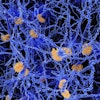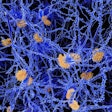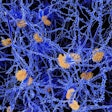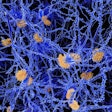
Quantifying certain proteins in cerebrospinal fluid (CSF) could improve the diagnosis of Alzheimer's disease and prediction of disease progression, according to a paper in Science Translational Medicine.
The recognition that people with Alzheimer’s undergo biological changes years before the onset of clinical symptoms has spurred research into markers that may enable physicians to detect the disease before cognitive decline begins. Bringing forward disease detection may lead to improved health outcomes if it is combined with the development of interventions that are effective in preclinical patients.
That prospect led researchers at Emory University to use a high-throughput mass spectrometry assay to quantify 48 proteins in CSF samples. The samples were taken from 706 participants in the Alzheimer's Disease Neuroimaging Initiative; the proteins were selected based on earlier work aimed to integrate CSF and brain proteome networks.
Nicholas Seyfried, professor of biochemistry at Emory’s School of Medicine and co-senior author with Thomas Wingo and Allan Levey, outlined the thinking behind the approach in a statement.
“The idea is that could we come up with a peripheral marker to reflect the underlying brain pathology that's easier to obtain, faster to run, and that we could screen population wise. Are you higher or lower than the average? You are either in the middle, which means you're normal, or you’re below, which is probably a good thing with this protein panel. Or you're a standard deviation above the mean. Which would indicate a risk profile,” Seyfried said.
The 48-protein panel was at least as effective at predicting clinical diagnosis and measures of cognitive and dementia severity as existing CSF biomarkers such as amyloid beta and tau. Adding the panel to the existing CSF biomarkers significantly improved diagnostic performance across all the studied endpoints. The combined test was the most effective way to predict cognitive decline and dementia severity.
Further validation is needed, but the study suggests that the 48-protein panel complements existing CSF biomarkers and may improve the diagnosis of Alzheimer’s and the prediction of cognitive decline and severity of dementia. The panel may complement the biomarkers because it “reflects a range of altered biology observed” in Alzheimer’s and related disorders, the authors wrote.



















